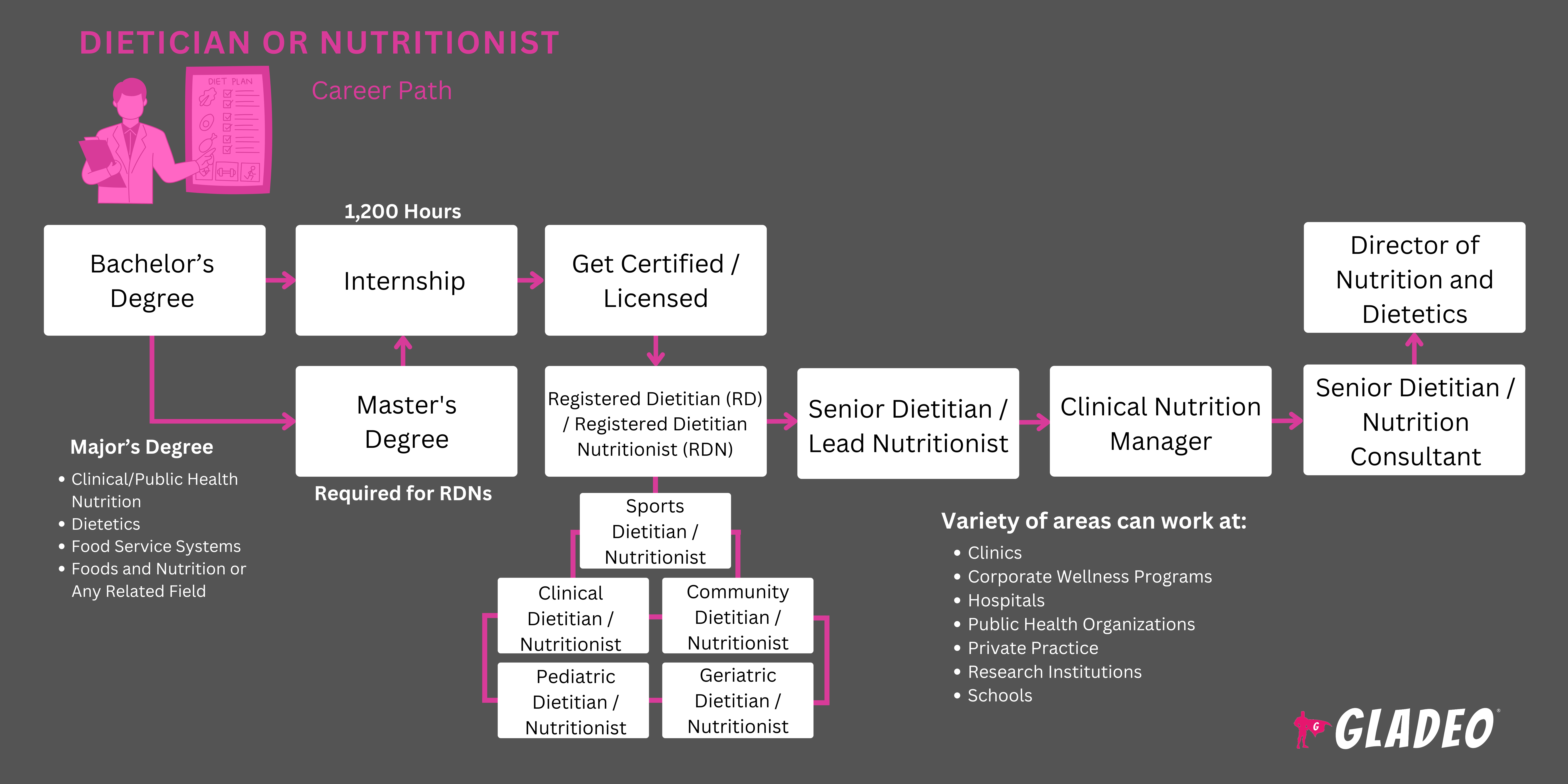聚光灯
注册营养师、临床营养师、营养顾问、营养教育师、社区营养师、健康教练、运动营养师、公共卫生营养师、食品与营养专家、营养技术员、营养师
营养师和营养学家通过教育人们养成健康饮食习惯来提升精力,并帮助预防或缓解糖尿病、心脏病等健康问题。由于每个人的营养需求各不相同,从业者需要掌握各类疾病的广泛知识,并了解针对这些疾病的最佳饮食方案。该领域往往高度个性化,要求从业者深入了解受助者的情况,同时与其他医疗专业人员协作。
多数营养师在医疗机构工作,但也存在独立执业者开设个人诊所的情况。部分从业者专注社区实践,服务青少年或老年群体。这类营养师可能在医院、学校、政府机构甚至非营利组织工作,承担更广泛的职责,包括制定大规模膳食计划、采购管理、预算控制,有时还需指导团队成员。
- 帮助个人实现其膳食目标
- 改善特定医疗状况患者的生活质量
- 为学校、医院、监狱和养老院等场所提供关键营养支持
工作日程
- 营养师和营养学家通常从事全职工作,工作地点多在室内,但偶尔需要外出。私人顾问可能需要提供灵活的工作时间以满足客户需求。
典型职责
- 审查患者/客户的病史,包括问题区域
- 制定饮食方案以应对或预防相关健康问题
- 根据客户的喜好和需求,制定餐食计划并撰写准备说明。
- 探讨健康饮食选择,并激励客户避免食用对身体产生负面影响的食物或物质。
- 审查进度并作出相应调整,以确保按计划推进
- 在课堂上教授营养学主题,包括饮食习惯如何影响疾病。
- 制作创意图形、幻灯片或其他教育和课程材料
- 评估较大群体(如学生群体)的需求
- 监督餐饮服务供应商;评估其对相关健康、安全及营养标准的遵守情况
- 必要时与其他医疗专业人员进行联络
额外职责
- 根据需要培训工人
- 及时掌握领域内的变化;生成报告并起草政策
- 为大规模运营推荐并采购(或协助采购)合适的食品;跟踪预算与支出情况。
- 为特定情况设计并测试专用餐食
- 营养项目资助申请草案
软技能
- 积极倾听
- 擅长解决问题
- 分析性
- 富有同情心的
- 文化敏感度与认知
- 渴望并有能力帮助他人取得成功
- 富有同理心且耐心
- 英语能力
- 领导力与培训技能
- 组织能力
- 个人服务能力
- 富有说服力且积极主动
- 协调与指导活动的能力
- 对基础心理学的理解
技术技能
- 擅长预算和数字
- 熟悉生物学、科学和医学领域的技术主题
- 营养相关程序,如Axxya Systems营养师专业版和Compu-Cal
- 数据库用户界面/查询软件
- 医疗软件,例如BioEx Systems的Nutrition Maker Plus和Lifestyles Technologies的DietMaster Pro
- 网络会议软件
- 标准办公套件应用程序
- 平面设计应用
- 医院
- 门诊护理中心
- 养老院/住宅式护理机构
- 政府机构
当今社会,众多民众往往忽视甚至刻意回避合理饮食与营养的重要性,这已导致美国陷入健康危机。营养师和膳食学家需为服务对象提供切实可行的解决方案,他们肩负着帮助患者、客户乃至大型群体保持健康、预防健康问题或管理现有健康问题的责任。
营养师与膳食师必须倾尽所能,在对抗肥胖症、糖尿病及心脏病的战役中发挥专业作用。除日常工作外,他们还需投入大量时间进行研究与撰写专业文献。对于私人执业者而言,除维护现有客户关系外,更需花费大量无偿时间通过广告宣传拓展客户群体。
美国肥胖率已飙升至前所未有的水平。美国疾控中心指出"2017至2018年肥胖率达42.4%",并强调"肥胖相关疾病包括心脏病、中风、2型糖尿病及某些癌症,这些疾病是导致可预防性过早死亡的主要原因"。 事实上,每年都有数千人因饮食营养问题过早离世,而这些本可通过改善饮食习惯来预防。研究还表明,这些健康问题对少数族裔群体及面临社会经济困境的人群影响尤为严重,这一趋势必须直面解决。 与此同时,婴儿潮一代虽然寿命延长,但健康状况未必改善。随着他们对医疗体系需求的增加,获得专业膳食营养服务以维持健康至关重要。
营养师和膳食师乐于与他人合作并提供帮助,因此这很可能是他们一直乐在其中的事情。他们可能从小在学校就热衷于体育运动。 或许他们还精通厨艺,能为亲友烹制出兼具美味与营养的各式佳肴。由于职业要求扎实的生物学与健康知识,他们在相关学科领域往往成绩优异。这类人常具独立特质,自信从容地独立工作甚至经营事业,这表明他们年轻时就培养了商业思维,且极可能具备高度责任感与理财能力!
- 学士学位加长期带指导的实习
- 艰苦且竞争激烈的营养学实习项目需要完成约1,200小时的实践。
- 学士学位涵盖多种专业和研究领域,通常包括:营养学、食品服务系统、食品与营养学,或临床/公共卫生营养学。
- 营养与饮食学教育认证委员会应负责对相关课程进行认证,该委员会隶属于美国营养与饮食学会管辖范围。
- 某些州要求执照和认证
- 持有由膳食注册委员会颁发的可续期注册营养师资格证书是有帮助的,在某些情况下更是必要的。
- 认证营养专家是一项高级资质认证,要求申请人具备研究生学位并完成1000小时的监督下工作实践。
- 此外还有专业领域的认证,例如肿瘤学、儿科和运动医学等。
- 约24%的劳动者还完成了研究生学位。
- 理想情况下,相关课程应获得营养教育认证委员会的认证,这是某些认证的必要条件。
- 探索在线、校内及混合授课模式,选择最适合您时间安排和地理位置的课程。
- 查看大学或项目是否提供奖学金或学费减免。
- 查看学校的全国综合排名以及特定专业的排名
- 仔细查阅招生、毕业及多元化统计数据,同时关注毕业生就业率!许多院校与本地招聘机构建立了紧密的合作关系。
- 探索那些能促进你学习与成长的学生组织和社团
- 请确认您的项目是否允许同时完成任何实习要求。
- 若你打算从事私人执业,请务必认真学习营养学、化学、心理学、生物学和商业相关的课程。
- 尽早思考你希望工作的领域,并规划出为争取这些职位所需积累的工作经验和学术经历。
- 在支持营养教育或其他健康主题的本地机构担任志愿者
- 在草稿简历上记录你的成就,这样等到开始申请时就不会遗漏任何内容。
- 请记住,除了学士学位外,通常还需要完成1200小时的营养学实习。
- 了解您的社区,掌握影响优质健康食品获取的因素
- 了解您可能为之工作或与其合作的各类政府机构,以及在当地学校、监狱系统、诊所和非营利组织中的就业机会。
- 若你计划自主创业,不妨从撰写文章着手,借此提升知名度,逐步树立自己在该领域的专家声誉。
- 拓展您的职业人脉网络;与那些能助力您未来职业目标的人士保持联系!

- 完成所有必要的教育,包括根据您所在州和工作职责要求的认证或执照要求。
- 请仔细阅读所有招聘广告,并在申请前确保您符合所列资格要求。
- 注意关键词,并在简历中使用它们,以帮助通过求职者追踪系统的筛选!
- 请提供足够的细节来支持您关于教育背景和工作经历的陈述。
- 在Indeed、Monster和Glassdoor等招聘门户网站以及LinkedIn等多功能平台注册账户。
- 提前询问潜在推荐人是否愿意撰写推荐信,或接听招聘经理的电话、回复其邮件。
- 通过模拟面试和查阅可能被问及的问题及答案来做好准备。
- 查看Indeed的求职面试着装指南
- 乍看或许不明显,但随着对有益健康和预防疾病的研究不断深入,食品与营养领域正持续发生着变化。
- 及时了解影响您职责与责任的最新动态与趋势
- 获取继续教育和培训的证明,可通过考取专业及高级认证,例如注册营养专家认证。
- 成为你所服务人群的坚定代言人,尤其当你负责服务那些被忽视、代表性不足或处于风险中的群体时。
- 与本地机构建立合作伙伴关系,这些机构应与您的目标相契合。
- 走出办公桌,深入了解社区需求及获取服务的障碍
- 只要有机会,就主动请缨去讲课或授课。若未发现机会,就主动出击,主动提供服务来创造机会。
- 以尊重和理解的态度对待患者和客户。许多人一生都在与饮食问题作斗争,因此改变需要时间和毅力。
- 提升知名度,推广您的作品!起草资助申请书,为那些引人瞩目的大型项目争取资金支持。
- 参与专业组织。出席会议并发表主题演讲。撰写文章、登上新闻版面,传播健康生活理念。
- 攻读硕士或博士学位吧!近四分之一的营养师和营养学家拥有研究生学位。
网站
- 美国营养与饮食学会
- 营养与饮食学教育认证委员会
- 美国糖尿病教育者协会
- 美国营养学院
- 美国糖尿病协会
- 美国营养学会
- 美国肠外与肠内营养学会
- 营养与餐饮服务专业人员协会
- 营养专家认证委员会
- 膳食注册委员会
- 医疗保健社区中的营养学
书籍
要成为营养师或营养学家需要付出巨大努力,有时教育要求甚至令人望而却步。若你对这一行缺乏热忱,或许将时间精力投入其他职业更为明智。美国劳工统计局列出了以下可供考虑的类似职业:
- 健康教育工作者与社区卫生工作者
- 注册护士
- 康复顾问
- 您还可以访问O*Net Online,了解以下领域的职业信息:
- 医疗与健康服务管理
- 医学科学
- 健康专业教学
- 家庭与消费科学教学
- 农场与家庭管理教育
新闻源

精选职位

在线课程与工具

年薪预期
新员工起薪约为8.5万美元。年薪中位数为9万美元。经验丰富的员工年薪可达10.7万美元左右。
年薪预期
新员工起薪约为8.9万美元。年薪中位数为10.5万美元。经验丰富的员工年薪可达12.7万美元左右。
年薪预期
新员工起薪约为8.2万美元。年薪中位数为9.7万美元。经验丰富的员工年薪可达12.2万美元左右。
年薪预期
新员工起薪约为7万美元。年薪中位数为9.6万美元。经验丰富的员工年薪可达10.8万美元左右。
年薪预期
新员工起薪约为7.9万美元。年薪中位数为9.9万美元。经验丰富的员工年薪可达10.6万美元左右。






